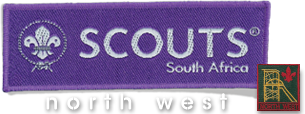 SCOUTS South Africa’s senior leaders and youth from across the country came together at the Gillwell Scout Training Centre in Johannesburg to discuss how Scouting in South Africa can increase its practices around sustainable consumption and the circular economy and include it in the organization’s plans going forward.
SCOUTS South Africa’s senior leaders and youth from across the country came together at the Gillwell Scout Training Centre in Johannesburg to discuss how Scouting in South Africa can increase its practices around sustainable consumption and the circular economy and include it in the organization’s plans going forward.
The training, supported by the Foundation for Environmental Education (FEE) #LitterLess and World Scouting, enabled the national, regional and youth leadership to talk about environmental challenges, share sustainable ideas, and work towards a greener future as part of SCOUTS South Africa’s continued commitment to contribute towards the global Sustainable Development Goals.
The training kicked off with a session focused on the key concepts of sustainable consumption and the circular economy. It explored how our daily consumption choices affect our planet, drawing attention to the food and landfill waste challenges in the Western Cape, and the lack of adequate waste management and recycling facilities around the country. Participants discussed how as an organization we can help raise awareness because if we want our young people to be part of the solution and adopt sustainable practices, they need to understand what this involves.
SCOUTS SA CEO Mr Wayne du Plessis elaborated on how meat is a big part of South African cultures and diets but also affects the environment. The poverty within our communities was also discussed. With millions of South Africans struggling to meet their basic needs, and therefore focus on survival, recycling is not a top priority. Another issue raised was the lack of proper infrastructure for waste management in many communities making recycling difficult.

Leaders also discussed how SCOUTS SA can set an example and help spread knowledge about sustainable practices in Scouting and the community. Chief Commissioner Gary Pienaar shared how recycling efforts at a recent event were hampered because of the lack of local waste collection services. “I propose that as an organization we consider including the disposal of our recycled waste in our event planning going forward. Even if the facilities are not there, as SCOUTS SA we should still adopt the principles of sustainable consumption and stay true to our commitment.” Regional Commissioner Angus Hay further suggested that SCOUTS SA should aim to use sustainable practices at big events like the 2nd Africa Scout Moot in 2027 to show how Scouting can lead the way.
Mpumalanga Regional Commissioner, Mr. Manqoba Dlamini, added: “South Africa needs better skills and infrastructure to tackle these problems. As Scouts we can help by teaching young people these green skills. Green skills are going to be more and more important in the future and it is important that we give our Scouts the opportunity to learn them now.”
National Alumni Coordinator Kathleen Godfrey further highlighted the importance of adapting our sustainability projects to fit the needs of the communities in which they are implemented. “We need to understand people’s lives before introducing solutions that might not be sustainable.”

Chief Scout Khonzaphi, Chief Commissioner Gary, CEO Wayne and Regional Young Leader Reps.
To make real changes, the leaders and youth discussed current sustainable initiatives, such as SCOUTS SA’s Food for Life (FFL) programme. “This project allows Scouts to grow their own food and contributes to reducing hunger and building agricultural skills. It also reduces the need for transport and therefore greenhouse gas emissions. The FFL programme is already making a difference in the lives of our Scouts and their families and expanding it across South Africa could make a big impact” shares KZN Regional Young Leader Zamangwe Mazibuko.
As with all other initiatives, these projects would need to be funded to be sustainable. An enhanced drive to communicate, collaborate and partner with local governments, businesses, and organizations around sustainable practices was proposed.
In conclusion, both senior leaders and youth agreed that creating change takes time. By getting Scouts involved in responsible practices, aligning our programmes even more with the SDGs, and building partnerships, SCOUTS South Africa can play a key role in building a more sustainable future.

